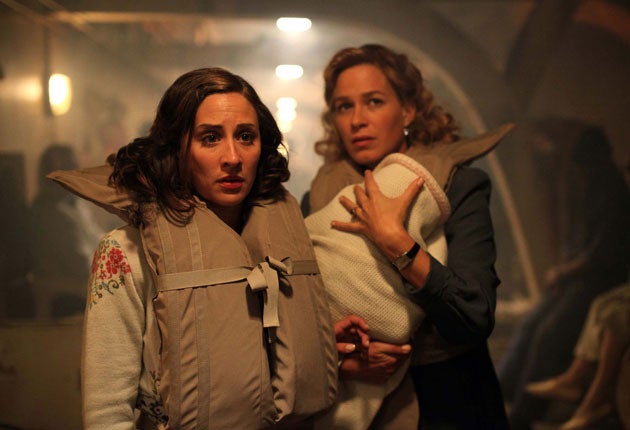The Sinking of the Laconia, BBC2, Thursday & Friday<br/>Sun, Sex and Suspicious Parents, BBC3, Monday
A ship goes down, but Bleasdale's writing wins the day for BBC drama

How many of those who tuned into The Sinking of the Laconia would have done so had Alan "Boys from the Blackstuff" Bleasdale's name not been attached to the Second World War drama?
I'm not sure I would have been as tempted, even though the real-life events on which this epic three-hour two-parter was based are undeniably compelling. In September 1942, RMS Laconia, a liner requisitioned by the British government and carrying civilians, wounded Allied soldiers and 1,700 Italian prisoners of war, was torpedoed off the coast of West Africa by a German U-boat.
When Commander Werner Hartenstein realised almost none of those on board had been legitimate targets, he abandoned Nazi protocol and set his crew about fishing survivors out of the water. That is, until American bombers failed to acknowledge the Red Cross banners draped from the U-boat railings and attacked, forcing Hartenstein to offload his human cargo back into the lifeboats.
Yet, despite such worthy subject matter, the premise sounded like the kind of TV that clumsily places drama in the service of history, or vice versa, and where one usually comes off the worse for it. But given that it all rested on the talents of Bleasdale – still Britain's greatest TV writer in spite of the fact that it's been more than a decade since he has written for television – I should have had more faith. For if this wasn't the best bit of drama on the BBC in 20 years, I'm hard pressed to name anything in recent memory that exceeds it in quality.
It has of course become a moral imperative that any modern representation of war demonstrates the suffering that spans battlelines, but it takes an exceptional writer to deliver a message of common humanity without descending into the trite. The strength of this effort lay in Bleasdale's knack for putting exactly the right words in the mouths of a vast range of characters – from the straight-as-a-die Liverpudlian Merchant Navy officer to the sardonic engineer of the U-boat – with the result that you needed very few lines to believe in them. His skill in capturing the comic and poetic of which ordinary people are capable adds to the pleasure.
Interestingly, the German spoken among the U-boat crew was left in the original and subtitled – a bold decision given our chronic British aversion to the format, but it felt right. It embodied an idea that seemed to inform everything about Bleasdale's telling of the story – that there can be understanding without any reductive attempt to deny differences. At the end, we learnt that Commander Hartenstein was killed soon after the Laconia incident; as an epitaph, you couldn't do better than Bleasdale's drama.
In a galaxy far, far from the Laconia, well, in the Cretan resort of Malia, BBC3 was serving up some typically lurid-sounding fare. In Sun, Sex and Suspicious Parents, two groups of teens are sent on their first foreign holiday without their mum and dad. Little do they know, however, that the grown-ups will be hiding round the corner watching.
If this sounds like an infringement of their rights, it's worth remembering that the kids think they're being filmed for a straight documentary, so they should have considered the possibility that their antics would come home to roost. Perhaps that's why the girls played it sensibly – "I'd like to see them really let go," complained one of the adult spies in what must be the worst indictment possible for a teenager. The boys were less cautious, particularly in their alcohol consumption, but there was still something rather charming about the easy satisfactions that novelty brings – "It's like a penthouse!" enthused one lad, on seeing their dingy set of rooms. Ah, the low expectations of youth.
Join our commenting forum
Join thought-provoking conversations, follow other Independent readers and see their replies
Comments